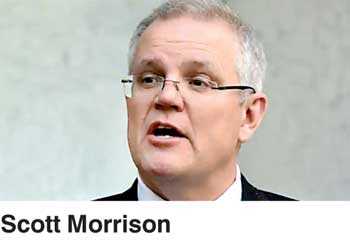Tuesday Feb 17, 2026
Tuesday Feb 17, 2026
Saturday, 25 August 2018 00:10 - - {{hitsCtrl.values.hits}}
 CANBERRA (Reuters): Australian Treasurer Scott Morrison will become Australia’s new prime minister after winning a Liberal party leadership vote on Friday, ending an internecine battle that has scarred the conservative government ahead of an election due by May 2019.
CANBERRA (Reuters): Australian Treasurer Scott Morrison will become Australia’s new prime minister after winning a Liberal party leadership vote on Friday, ending an internecine battle that has scarred the conservative government ahead of an election due by May 2019.
Morrison, who will be Australia’s sixth prime minister in less than 10 years, emerged victorious from a three-way race with former home affairs minister Peter Dutton and Foreign Minister Julie Bishop.
Incumbent Prime Minister Malcolm Turnbull, who called the leadership meeting after losing the majority support of the party, opted not to contest the vote. Turnbull told reporters after the vote he would leave Parliament “not before too long”.
The Liberal party is the senior partner in the conservative Liberal-National coalition government that has consistently trailed opposition Labor in opinion polls in recent months. The leadership battle was sparked on Tuesday by an unsuccessful challenge by Dutton, who narrowly lost a vote against Turnbull.
Under intense pressure to call a second vote, Turnbull convened a party meeting on Friday after receiving a letter signed by the majority of party members calling for a change of leader.
Turnbull’s decision to leave parliament means the new government will face a by-election for his Sydney seat that could see it lose its one-seat majority. Australian media reported that Foreign Minister Bishop, having been defeated in the leadership ballot, would also likely resign from politics.
Turnbull came to power in a party-room coup in September 2015. A social liberal and multi-millionaire former merchant banker, he has struggled to appeal to conservative voters and only narrowly won a general election in 2016.
Australian...
Morrison’s victory was welcomed by financial markets, which have been rocked by the political instability. Australian shares edged higher on Friday, rebounding after three days of losses that saw the benchmark fall 1.5%.
“PM Morrison is the most market-friendly option,” said Annette Beacher, Chief Asia-Pac Macro Strategist at TD Securities in Singapore.
However, Beacher said markets would be looking to see whether Morrison can narrow the gap with opposition Labor.
“The skew towards the Labor party at this stage ensures they will form government at the next election,” she said.
It was also hoped Morrison would end a decade of political instability during which time no prime minister has completed a full term in office.
“The political turmoil of the past decade has come at the cost of our global competitiveness ... the business community needs policy certainty to promote investment and improve business confidence.” said Tony Johnson, Chief Executive Officer of Ernest & Young.
However, Morrison’s victory in the final ballot against Dutton, winning 45-40 votes, suggested possibly more political instability, said Shane Oliver, chief economist at AMP Capital.
“Scott Morrison’s relatively low margin of victory still poses the risk that there may still be more turmoil ahead,” he said.